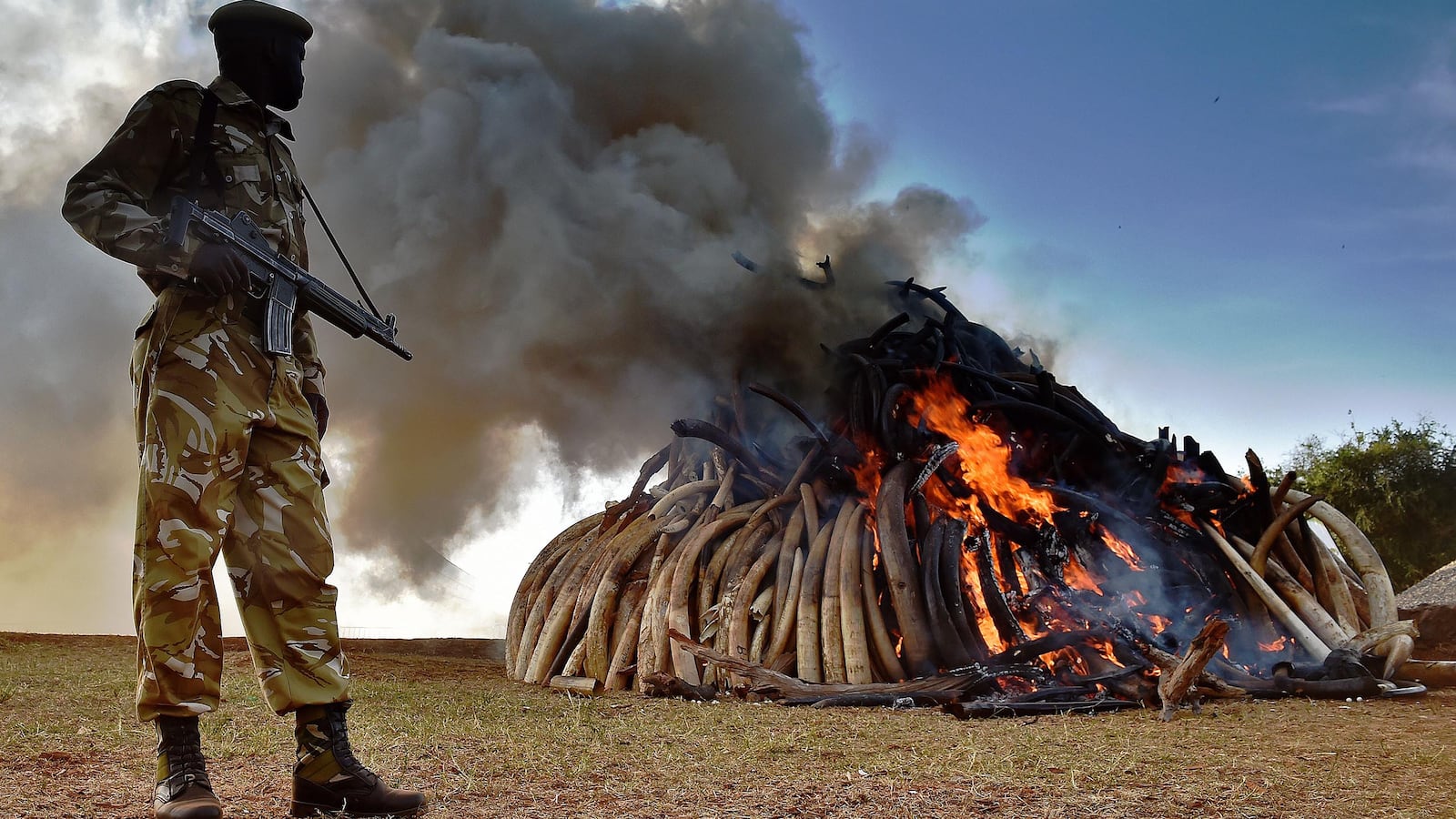The illegal animal trade is the third or fourth largest contraband market in the world (behind guns and drugs, and sometimes human trafficking). Worth billions of dollars, it spans multiple industries, from food, jewelry, furs, skins, art, herbal supplements, and trophies.
“You name it and animals are into it,” says Rachel Nuwer, author of the new book Poached: Inside the Dark World of Wildlife Trafficking. “A lot of people are making a lot of money.”
But while the trade is threatening the planet’s biodiversity, there’s very little at risk for perpetrators. Nuwer, who has spent years covering poaching for the New York Times and National Geographic, went into the field to meet poachers, their associates, the people who buy their illegal goods, and the activists that try to stop them.
Nuwer sat down with The Daily Beast to talk about the state and future of poaching. (This interview has been lightly edited and condensed for length.)
Do you think that people fully understand why poaching happens?
A lot of people have a misconception about why these animals in Africa are being killed and their parts are being taken to Asia, including conservationists. Yufang Gao, an anthropology and conservation doctoral student at Yale, is studying the different perceptions—who is actually buying ivory and why. His whole thing is: “Look guys, nobody understands each other here.” People in Africa think it’s one thing, people in the West think it’s another, and people in China something else.
Everybody in the West thought poaching elephants was happening because of middle class Chinese are suddenly having wealth and wanting to buy ivory pieces to show off. That’s part of it, but it’s not the only part. It turns out there’s also a group of people who buy ivory to try to tap into their roots. It’s a culture-seeking movement. They’re called the cultural collectors—they want ivory as a means of tapping into old traditions. Chinese people are missing their identity now that China’s modernizing. Ivory represents old times, a rosy view of ancient China: rhino horn carving, martial arts, and antiques.

Then there are also groups of people who are collecting ivory and rhino horn for prospecting purposes. They’re hoarding it in the hopes that it becomes valuable in the future. Basically they’re banking on extinction.
Is there any possible way to regulate poaching so that it happens in a sustainable way?
The word you’d want to use there is hunting, because that’s the legal way. Trophy hunting is legal in a lot of countries in Africa. The US has its rules about which trophies can be imported.
[Trophy hunting] has a lot of shady players and problems, but there are examples of it bringing great things for conservation. Animal welfare people will crucify me for saying that, but in a lot of places in Africa, trophy hunting is the only way we have for bringing money for conservation. It targets old animals or males and puts a cap on the number of animals so that it doesn't have population impacts.
I feel like the outrage at trophy hunters is really misplaced, unfortunately. We should be mad at the people doing this illegally and the people bankrolling them.
Have there been any negative impacts on the state of poaching from the current administration? They don’t seem to be too concerned about extinction or animal welfare.
Obama created an illegal wildlife taskforce, one of the biggest efforts of any country to tackle this, even though conservationists complained it was minuscule compared to military spending. So far things have continued uninterrupted. The only thing I’ve heard about is trophy rule changes, but that’s less the administration and more people in Fish and Wildlife evaluating things to see what countries have met efforts on the ground and which have not. The nice thing about the illegal wildlife trade is it’s kind of a bipartisan issue.
So what animals are getting the most public attention and which are the ones being largely ignored?
Elephants, rhinos, and tigers are the big three we hear about. Those are also where all the money goes. Elephants are the biggest land mammal and tigers are these badass beautiful predators. These are animals we grow up with as cartoons as kids and ones we see on the Discovery Channel.
The animals that don’t get attention are basically everything else, period. Especially in Asia. Everything from civets, these cat/raccoon-looking small carnivores, to turtles, marine and freshwater turtles and tortoises are being hammered, snakes, lizards, and songbirds are a really big one. A lot of places, especially Indonesia, they have songbird competitions and a saying that goes: “An Indonesian is happy if he has a home, a wife, and a bird.” They’re not killing them, they’re capturing them. But that’s effectively killing them in terms of the ecological world. Millions die in captivity. They’re not having happy lives.
My favorite overlooked animal is pangolins. They’re the most trafficked mammal in the world. Over one million of them were killed in a decade for illegal trade. By comparison, for the seven year period from 2007-2014, about 144,000 elephants died or were lost, much of it due to poaching (that number also included poisoning from elephants eating people’s crops or dying naturally, but much of it was due to poaching).
Snakes and turtles? Those seem like very ubiquitous animals to be trading illegally.
Right now I’m talking about Asia, which is where the center of demand is. Turtles are abundant here in the US—you can go out and see them in a pond. You’re not gonna see that so much in Vietnam because they’ve been poached out of all but the most protected remote places. In Vietnam, China, and some other places many people believe that meats from wild animals is super-healthy. They think if you eat a tiger you’re going to have the strength of that animal. If you eat a snake your arthritis is gonna go away because a snake is flexible. They believe that wild animals have intrinsic properties that we can absorb through eating and they’re tough because they’ve eked out a living in nature. They’ve made it. They're healthy and clean. Additionally, with pangolins or tiger, there’s the exclusivity quality. Because they're so rare and protected, if you can get a hold of their meat that means you are a powerful, rich, usually guy, who can flaunt the law and has the connections to get these things. If you serve it to your family or business connections it’s the biggest show.

You spent a lot of time talking to criminals and poachers while researching the book. Were there any moments where you were scared?
This is kind of weird and I feel bad throwing animals under the bus but the most threatened I felt for my safety was because of an elephant. I was interviewing some people around an outdoor seating area in Chad with—these are two super-experienced lifetime conservationists, they’re Africans and have worked all over Africa—there was an elephant nearby eating a tree and at some point it started walking towards us. The guy got up to try to distract it and the woman’s face next to me was grave. And I was like: “Oh this is it ,we’re going to die.” The elephant ended up going towards the guy and he got it to go away. And I was shaking.
That was the most scary thing. Not the people. Yes, these people involved in the trade are criminals, but they’re not afraid of being caught because people don’t care about stopping them. They’re not worried you're an undercover cop because nobody cares. They have nothing to hide. I was talking to a Vietnamese journalist who does a lot of reporting on this. I asked: “Should I be scared?” He said all these people want is money and as long as you're not threatening their money they don’t care.
They’re so blasé they’re trading orangutans on Facebook. You can find ads for orangutans on Facebook, that’s how big of a mountain we have to climb here.
Is there anything the average person can do to have an impact on ending poaching?
The first things are super-basic and don’t require time or money: Don’t like things on Facebook or retweet or like things on Instagram that involve dubious wildlife use. I recently saw a friend post a video of a baby chimpanzee in a diaper in someone's house. It’s not cute. Its mom was probably shot and it was taken to be someone’s pet in Dubai. If you see something like that and you’re comfortable, PM the poster or write a polite comment explaining why that’s not cool.
Likewise, if you go to Thailand for vacation, don’t go to a tiger park. Or South Africa, don’t go to a lion place. You can go cuddle with cute cubs, they’re adorable, but they’re being raised to be killed. Just don’t do it. It’s all shady. These cubs have to grow up and you never see the adults. They’re shipped out the back door be turned into wine, tiger bone glue, meat, and jewelry. The cubs are churned out. It’s a massive breeding operation.
If you see something you can say something. If you see a caged orangutan on your vacation to Bali, you can write to the Indonesian ambassador politely saying what you saw and that it’s a problem. It’s bad press for them and it’s important to hear from visitors paying money. Imagine if 500,000 people wrote that email. Tourism is a really big component of the economies of these countries.
You can also ask your local zoo and or exotic animal pet shop where they got their animals. There’s a big industry importing animals that have been illegally caught from the wild, but doing so under the guise that they were bred in captivity, which makes them legal. If you express to your pet shop or zoo you just want to see animals bred in captivity that helps.
The last thing is the most obvious but donate to effective conservation organizations. World Wildlife Foundation is the biggest conservation group in the world. The Wildlife Conservation Society does good work and research. You can also find really small non-profit grassroots groups working on the ground, usually staffed and run by people from that place. One of my favorite examples is Save Vietnam’s Wildlife. They're are the only group in Vietnam that has the capability to rescue pangolins -- they have the skills and the space. African Parks in Africa specializes in rehabilitation failing national parks. The government hands over management of their national parks to them and they turn it around. They’ve had absolutely spectacular successes.
Can this actually ever be stopped?
That’s up to us. I think a lot of animals are going to be lost before we get a handle on this. But the sooner we start paying attention and caring the more animals we’re gonna save. It can be done. It’s just up to us how quickly. I really think it can be done.






